McCollum Lives 'Life in Abundance' at Orphanage Emmanuel
By: Jamie Creamer

Labor of Love-Above, Wade McCollum weighs chickens raised at Orphanage Emmanuel as three of his students from the orphanage look on. The orphanage farm McCollum manages has broilers and layers in its poultry operation. Below, McCollum sits behind the wheel as a group of volunteers from First Baptist Church of Opelika gathers around him on its recent visit to the orphanage.
They say the average American farmer today feeds 129 people.
Wade McCollum helps feeds 450. Every day.
He does this on the relatively small but thriving poultry, swine and produce farm that he manages.
The farm is in Honduras, part of an orphanage that the Lineville, Ala., native and AU College of Agriculture alum now calls home.
"I am here for life," McCollum says. "My commitment is lifelong."
Some may talk about what a tremendous sacrifice McCollum has made, giving up a comfortable living and a comfortable life to go labor for minimal wages in an underdeveloped, impoverished country.
But they'd be gravely mistaken.
"My life here is one continuous blessing," McCollum says from the orphanage, over patchy Internet phone lines. "I haven't 'sacrificed’ anything. What I'm experiencing here, every day, is life in abundance.
"Coming here, my life has been transformed from darkness to daylight."
It was in 2002 that this faith-guided transformation occurred for McCollum.
From all outward indications at the time, McCollum had a good life with a promising future. He was young and single, had two degrees-a bachelor's in horticulture (1998) and a master's in ag finance (2000)-from Auburn University and had a good job as an up-and-coming field representative with a national agricultural leasing company.
But for McCollum, something was missing.
"I remember that, basically, I just wasn't happy, and I didn't know why," he says. "I was bothered by something, but I didn't know what. It was like, this wasn't what I was supposed to be doing with my life, but I had no idea what that was."
Eventually, he decided to take a giant leap of faith and turn things over to his Higher Power.
"I told the Lord, 'OK, here I am. I'll do anything you want me to do. Just show me what it is,'" McCollum recalls.

David and Lydia Martinez began Orphanage Emmanuel in December 1989, providing food, clothing, shelter and spiritual healing to five Honduran orphans. Today, the orphanage is home for more than 425 children of all ages from backgrounds of abuse and abandonment. To learn more about Orphanage Emmanuel, including how to volunteer or how to sponsor a child, go to www.orphanageemmanuel.org.
While he waited on the Lord to give him some direction, he decided to take a break, clear his head and just get as far away from it all as he could. He knew just the place to do that: Orphanage Emmanuel in Guaimaca, Honduras.
McCollum had discovered Orphanage Emmanuel in the spring of 1999, when he'd gone with a group of 30 other AU students from First Baptist Church of Opelika on a mission trip to Honduras.
"We thought we were going down to help clean up after Hurricane Mitch, which had hit Honduras in October of 1998, but instead we wound up going to this orphanage, where we did light construction projects and played with the kids," McCollum says. "It was really a rewarding and uplifting experience, but it never crossed my mind I'd ever go back."
A year later, though, when he overheard of couple of First Baptist resident members talking about going back to the orphanage, McCollum decided to make the week-long trip again.
"I wound up coming down here four times in four years," McCollum says. "Coming here was how I would spend my vacation."
The job he landed after earning his master's was with an agricultural leasing company, Telmark Inc., as a district representative covering Alabama and part of Tennessee.
"I enjoyed the people I worked with, but not the job," McCollum says. "There was too much travel and too much time away from home. The type of work and routine just did not suit me."
It was in May 2002 that McCollum, after much soul-searching and prayer, decided to leave his job and take some time off to decide what to do with his life.
"I'd always come to the orphanage to rest, as an escape almost, so I decided to come down here for three months and try to get my head on straight," McCollum relates. "I came as a volunteer and planned to just work in maintenance."
But God had different plans.
Earlier that year, Orphanage Emmanuel founder David Martinez had decided to start a farm on site to enable the orphanage to become more self-sufficient for certain products and to provide a training environment for the orphanage's older boys. When Wade arrived for his three-month volunteer gig, Martinez had gotten as far as constructing three block buildings-for swine, poultry and dairy production-and putting out the farm-manager-wanted word.
The day after McCollum's arrival-either coincidentally or by divine guidance, take your pick-three donated pigs arrived.
McCollum, who had grown up on a cattle and horse operation in Lineville, was the only person at the orphanage with any farm experience.
"So, I told David I'd take care of the animals the three months I was there, and that by then, the Lord would bring in somebody to take over and manage the farm," McCollum says. "Then, I was thinking, I'd go back home and find another job."
When those three months were up, though, and no farm manager had arrived, McCollum said, OK, Lord, I'll give you another six months to bring the right person.
"Those six months passed, and still nobody had shown up," McCollum says. "Finally, it dawned on me: I was the person the Lord wanted managing the farm.
"Sometimes, what you're supposed to do with your life is sitting right in front of you, staring you in the face, and you just don't see it. That was me.
"I've found what I was looking for."
And that includes not only his life's work, but his life's mate, Lourdes.
McCollum first met Lourdes on his first mission trip to the orphanage, where Lourdes, then 17, had lived since the age of 9. By the time McCollum arrived at the orphanage to live in 2002, Lourdes had joined the orphanage's small staff and was working as the director of girls and as administrative secretary. The couple married in November 2004 in the church at Orphanage Emmanuel and live on the grounds of the orphanage. They are supported by mission programs of three churches in Georgia and Alabama.
Orphanage Emmanuel is, in essence, a self-contained community. In addition to the church, the grounds include housing for all children and staff, dining areas, a gymnasium, medical and dental facilities, a laundry, a bakery, a private elementary and high school and, of course, the farm.
The farm, which was but a dream four years ago, now supplies all of the meat, poultry and eggs the orphanage needs, has a crops program that produces a good portion of the fruits and vegetables consumed by orphanage residents, and has a floral greenhouse.
McCollum is assisted on the farm by 45 of the orphanage's teen-aged boys, whom McCollum is teaching to do everything from processing slaughtered meat to rooting ornamentals.
"The teaching is one of the most exciting parts of what I do," McCollum says. "One of the greatest feelings is seeing the light of surprise in a child's eyes when he finally realizes that he can do something you've been trying to teach him to do. From that day on, he does it with confidence.
"Our goal is to teach these children that by a life of faith and using the intelligence they have and the skills they learn at the orphanage, they can reenter Honduran society as contributing citizens who are an example and a testimony for God to those around them."
Auburn University Board of Trustees member Virginia Thompson saw firsthand the many fruits of McCollum's labors when she traveled to Orphanage Emmanuel recently as part of a First Baptist of Opelika mission trip. Thompson terms McCollum's work with the farm "amazing."
So impressed was she that, in remarks she made during AU's spring 2006 commence-ment exercises, Thompson cited McCollum as an example of an Auburn graduate who is making a tremendous difference in hundreds of lives daily.
But McCollum says all credit is due the good Lord above.
"We realize every day that what we do, we couldn't do without the Lord," he says. "It is to Him that we give the glory."
